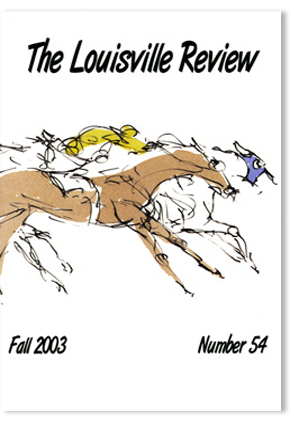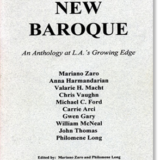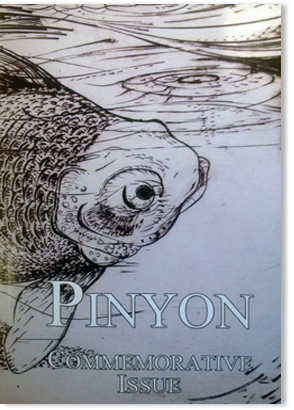
The Louisville Review
Tía Roberta
She was devoted to cauliflowers, Tía Roberta. She kneels on the center of her garden and prays. Por estas criaturas, Dios mío, por estas criaturas. For these creatures, my Lord, for these creatures. Look, look. Tía Roberta clears the thick leaves and caresses the white, wrinkly cauliflower heads. I am eight years old, early autumn, already cold. Tía Roberta’s husband feeds the geese. She kisses the cauliflowers and lifts her arms to the heavens. Tesoro mío, mis ángeles calvitos. My treasure, my little bold angels.
This coffee is so good, so good this coffee. Tía Roberta talks to my mother. That was last summer, when she came to visit us to bring persimmons for my father. He liked persimmons, strange fruit for a simple man who never asked for anything. Persimmons, maybe his only eccentricity. These are the best persimmons you ever have tried, the best persimmons. She drank her coffee with cup and saucer lifted over the kitchen table. I don’t want to make a mess. She held her sleeve with her hand and scrubbed the surface of the table. Like this, clean, clean. One, two, three, four circles, her sleeve pressed against the wood. Clean, clean. Not a single drop, not a speck.
I see him in the distance, almost erased, devoured by a storm of nervous feathers. Tío Patricio, Tía Roberta’s husband, feeds the geese. He flaps his arms and makes slow, clumsy noises, like a large bird trapped in the dizziness of brandy. Your Tío Patricio was a good man. The day we were married he took me on his donkey for the honeymoon. We didn’t go anywhere. We just went to the river, crossed the bridge and came back here. I crossed the bridge on top of the donkey. Como una reina. Then your Tío Patricio stopped the animal. As soon as I touched the ground I started to sing. I was not nervous, I sang until your Tío Patricio kissed my mouth for the first time. The donkey witnessed everything but he didn’t say a word. I remember the donkey’s nostrils, two black olives puffing over my head making a sound like sandpaper. Las cosas de la carne. The things of the flesh. What do you know? . ¿Qué sabes tú de las cosas de la carne?
This coffee is so good, so good this coffee. I hope you like the persimmons. Look, look at this one, look at this face, this little face, like a baby. I have my trees, my garden, you have your daughters, and your son. You are so lucky. I have my garden, these are my babies. She stopped. Silence carved all the wrinkles on her face. Her eyelids gave up, few lashes left, age takes everything, few lashes, wet at the edge. We couldn’t have children, you know, after what happened to me. We couldn’t.
Take this tray and bring it to Tía Roberta, my mother told me. Tell her it is for your sister’s wedding. Yes, my sister’s wedding was going to take place in a few weeks and it was customary to send a tray of baked goods to friends and neighbors. My mother covered the pastries with a white napkin. Two letters embroidered in a corner, faded by time but still blue and palpitating. Capital P and capital R, my mother’s initials. Go, go and take this to Tía Roberta. Don’t forget your coat, it’s cold, my son.
After what happened to me, we couldn’t have children. What happened to me, all that blood. I didn’t die because Virgin Mary was watching over me. She was watching. All that blood. I felt like my intestines were coming out of my body. That’s what you feel. All that blood, Virgin Mary saved me. My husband came, I remember that, but we didn’t call the doctor or anything. I just waited there. I waited and the Virgin Mary saved me.
Tío Patricio disappeared among the geese. Look, look at these cauliflowers. There was nobody else around, just Tía Roberta and me, early autumn, cold, inside and out.
After a month or so I went to the hospital. This coffee, this coffee you gave me is so good, so good. No, no, I don’t want anymore, I don’t want to bother you. I went to the hospital and this is what they did to me. She lifted her long, black, heavy skirt, no underwear, and I could see it. I saw her pubic hair, gray and scarce, weak and brittle like a sick fern. Then, behind the flesh, for a second, the quick shine of a piece of metal. Like a polished coin without marks or numbers. I went to the hospital and they put this down there. That’s what they did to me. To hold my intestines inside, to hold my intestines, they said. It’s like a spoon, like the head of a spoon with a hole in the center. After what happened to me, we couldn’t have children. Well, we couldn’t have any more children, because, the first one, the first one when I almost died, the first one when the Virgin Mary saved me, all that blood, the first one, that was a child, my only child.
I buried her here. Tía Roberta was standing in the middle of the cauliflowers, both hands pointing to the ground. I could tell it was a girl. A baby girl, that drenched flower crashed on the floor. All that blood, a girl. All that mud, we are made of mud, you know, mud that smells like rotten fruit. I still can see her hand, that skin, the veins, a slice of watermelon against the sun, the veins. A slice of watermelon. I named her Mary and I buried her here. It was a baby girl, a baby girl, that blood, that drenched flower.
Nobody else around. Tía Roberta cut out one of the cauliflowers and gave it to me. Here, for your mother. Put it on top of the tray, no, let me clean the tray first. Say thanks to your mother for the pastries and all the blessings to your sister. I hope she has a lot of children. We couldn’t have children after what happened to me. She placed the cauliflower on top of the tray and covered it with the white napkin. Don’t forget your coat, it’s cold out there. It’s cold.
I walked fast back home. I could feel my heart beat on my temples, on my hand, a heart beat coming from under the white napkin. My mother put the cauliflower on top on the table and cut it open with a kitchen knife. Both halves swining like a tumbler doll. A little soul vanished in the air. I closed my eyes and I prayed. Dios te salve, María, llena eres de gracia.





